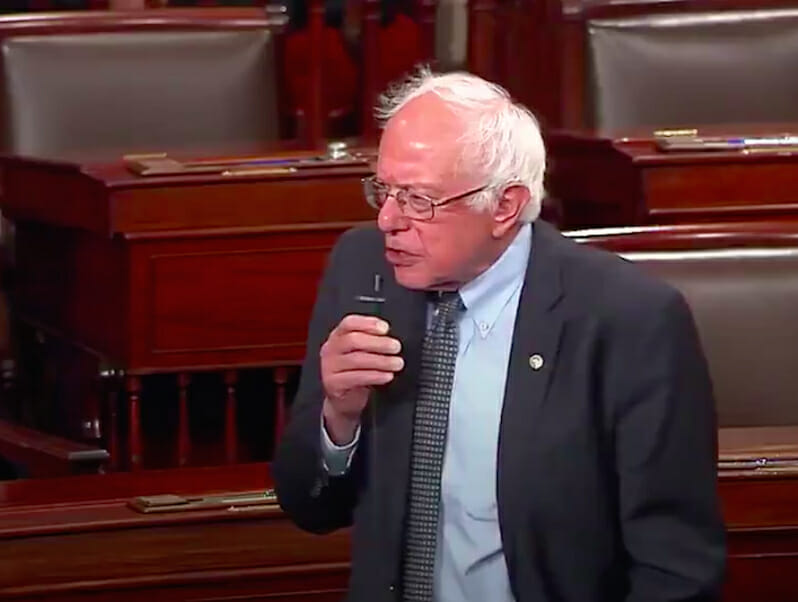Critics Argue ‘Skinny Repeal’ of Obamacare Would Have Dire Effects
Senate Republicans plan to finalize details of a bill that would roll back part of the Affordable Care Act, but opponents, including Sen. Bernie Sanders, call the bill disastrous. Sen. Bernie Sanders, I-Vt., arguing against the Republican "skinny repeal" bill on the floor of the Senate on Wednesday. (Screen shot via Twitter)
Sen. Bernie Sanders, I-Vt., arguing against the Republican "skinny repeal" bill on the floor of the Senate on Wednesday. (Screen shot via Twitter)
By Jon Queally / Common Dreams
Sen. Bernie Sanders, I-Vt., arguing against the Republican “skinny repeal” bill on the floor of the Senate on Wednesday. (Screen shot via Twitter)
With the latest reports on Thursday suggesting Republicans in the Senate are going to finalize the details of their so-called “skinny repeal” bill at a lunchtime meeting, opponents of the effort are decrying the bill as a “Trojan Horse” and “humanitarian catastrophe” that would strip healthcare coverage from millions of people while inflicting untold damage on the nation’s sick and vulnerable.
This is absurd, undemocratic and dangerous. Tens of millions could lose healthcare over a bill written on the back of a napkin. #Killthebill https://t.co/j1yYtoN3hn
— WorkingFamiliesParty (@WorkingFamilies) July 27, 2017
As groups at the forefront of the Trumpcare resistance effort urged members and constituents to jack up pressure on GOP lawmakers, a new analysis from the Congressional Budget Office released Wednesday found that even a scaled-back version of repeal would result in an estimated 16 million people losing their insurance and increase the average premium by more than $1,200 annually—more than 20 percent.
“If your Senator is saying they’re voting for Skinny Repeal to get to Conference, they’re lying. Whatever passes Senate will pass House,” declared Angel Padilla, policy director for Indivisible, in a Thursday monring tweet.
“Many in the media and elsewhere,” warned MoveOn.org’s Ben Wikler, “are mistakenly treating this bill as a procedural vote—an effort to simply to advance the process to a conference committee, in which the substance is irrelevant. In truth, if this bill passes the Senate, the House could simply pass the same bill. Senators who vote for this repeal legislation are endorsing its consequences, and will be held responsible.”
Both the contents of the bill and the strategic thinking behind it matter, added Wikler. “Today’s vote must be called what it is—an effort to strip care from millions and make health care worse for everyone, and a bill that could easily become law without alteration. MoveOn members are committed to holding every senator who votes for a such a bill accountable at the ballot box, regardless of whether the bill fails in the Senate, advances to conference committee, or—as is entirely possible if it passes the Senate—is rubber stamped by the House and sent to the president’s desk.”
On floor of the Senate on Wednesday, both Sens. Bernie Sanders (I-Vt.) and Ron Wyden (D-Or.) ran through the “most egregious” aspects of the bill they said would be a disaster for the American people:
Today I joined @RonWyden on the Senate floor to expose some of the most destructive aspects of the disastrous Republican health care bill. pic.twitter.com/K3iFs4tTcg
— Bernie Sanders (@SenSanders) July 26, 2017
Sen. Chris Murphy (D-Conn.) was among those warning that there’s nothing “skinny” about what the Republicans will put forth later on Thursday.
Don’t fall for GOP calling this “skinny repeal”. 18M people losing insurance in one year isn’t “skinny”, it’s a “humanitarian catastrophe.” https://t.co/FIa3QYc4dn
— Chris Murphy (@ChrisMurphyCT) July 27, 2017
Meanwhile, Robert Greenstein, founder and president of the Center on Budget and Policy Priorities, explained in a detailed blog post how the “skinny bill” would “cause tens of millions of people to lose their health coverage and millions more to pay much more, get skimpier coverage, or both.” The bill is rightly be called a “Trojan Horse,” he added—one that would do tremendous damage by itself but also allow for deeper cuts to Medicaid and a broader attack on healthcare protections contained in the Affordable Care Act (ACA) in the future. According to Greenstein:
No one should be fooled. As Senate Republican leaders have made clear, their goal in advancing the “skinny repeal” is simply to pass something that will advance health legislation to a conference with the House, which passed its own repeal-and-replace bill in May. That way, a House-Senate conference committee could produce a modified version of repeal-and-replace legislation for final votes in the House and Senate this fall.
GOP leaders would craft that version behind closed doors during Congress’ August recess and in early September. They would then present it to the House and Senate for final votes later in September, with limited debate and no amendments allowed — and with GOP leaders applying maximum pressure on Republican senators and House members to fall in line.
Ezra Levin, co-founder of Indivisible, which has led the grassroots mobilization against the Republican effort to pass Trumpcare, echoed those warnings:
Your support is crucial...Reminder @SenateGOP: If you pass ANY TrumpCare bill, the House can pass it to send to Trump. That’s how a bill becomes a law. It’s on you. pic.twitter.com/FB8depnBLC
— Ezra Levin (@ezralevin) July 27, 2017
As we navigate an uncertain 2025, with a new administration questioning press freedoms, the risks are clear: our ability to report freely is under threat.
Your tax-deductible donation enables us to dig deeper, delivering fearless investigative reporting and analysis that exposes the reality beneath the headlines — without compromise.
Now is the time to take action. Stand with our courageous journalists. Donate today to protect a free press, uphold democracy and uncover the stories that need to be told.






You need to be a supporter to comment.
There are currently no responses to this article.
Be the first to respond.